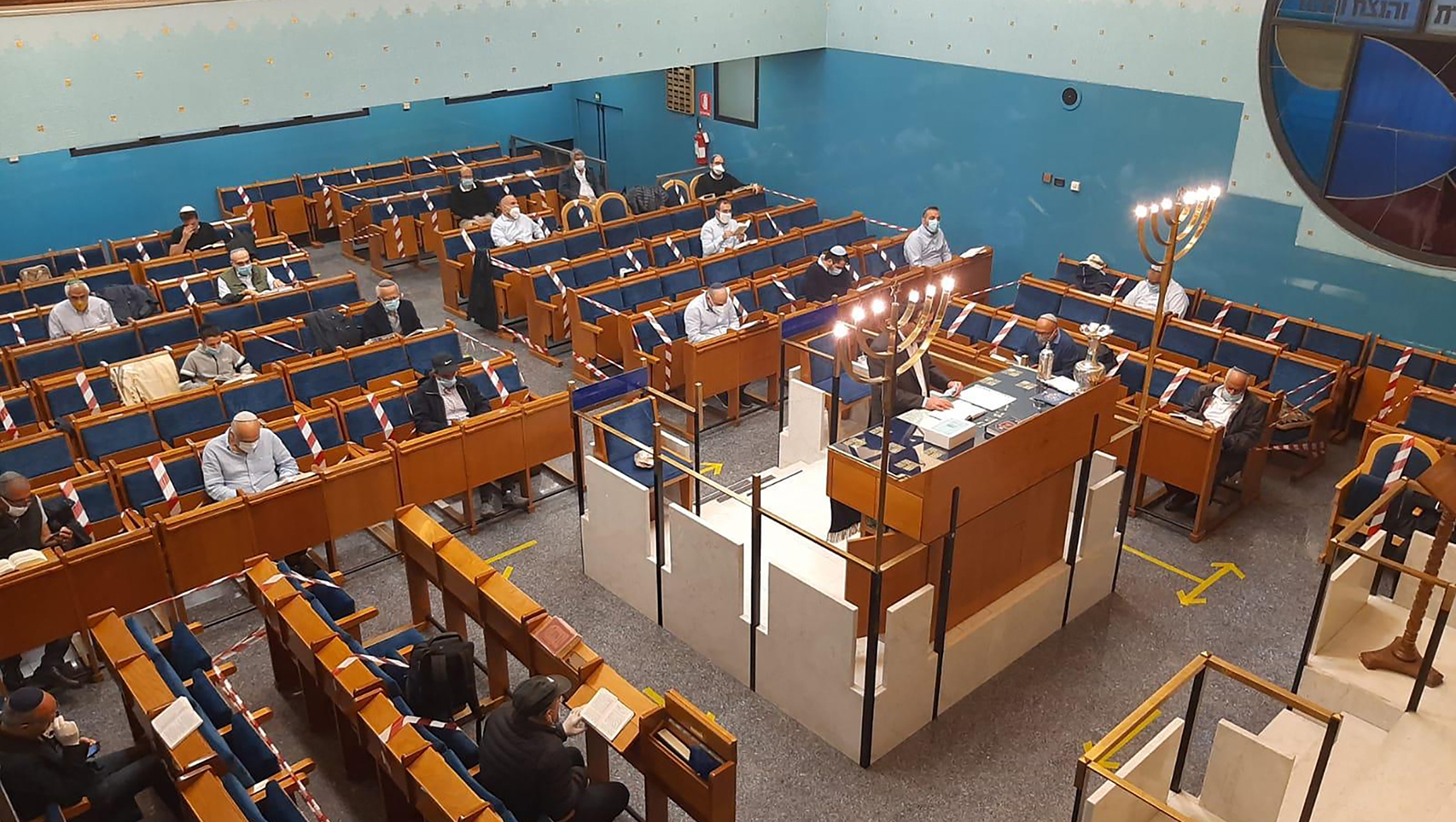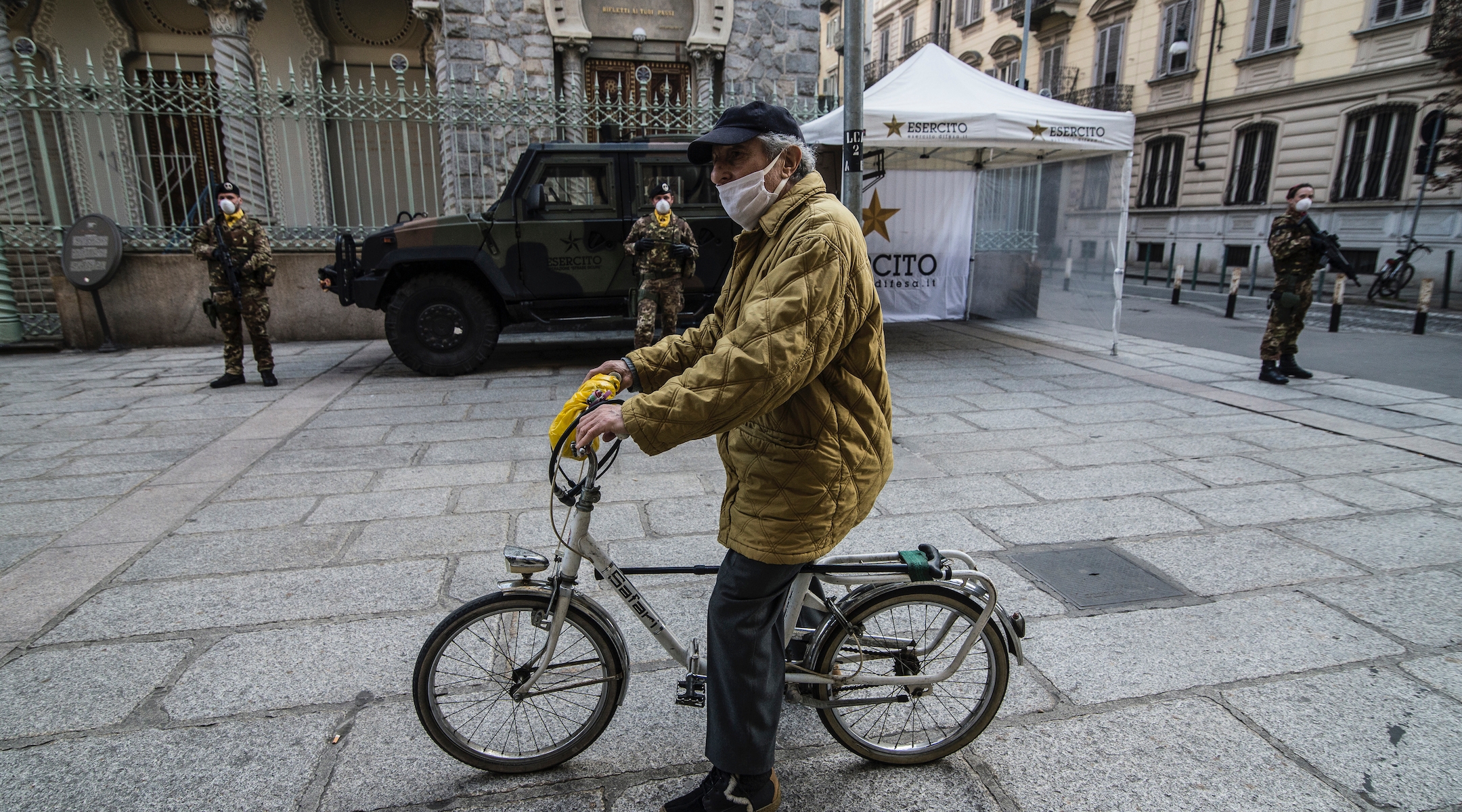(JTA) — The tables were still covered with open copies of the Book of Esther when Rabbi Yigal Chazan reentered his Milan synagogue this week.
The scripture is read during Purim, the Jewish holiday that took place more than two months ago. That was just when Beit Menachem, along with all other houses of worship across Italy, abruptly closed their doors as the country went into lockdown amid that country’s devastating coronavirus outbreak.
“It brought home how suddenly everything happened,” said Chazan, a 49-year-old Milan-born Chabad rabbi who has led Beit Menachem for the past 24 years, about seeing the books.
Coming back to synagogue after 10 weeks felt like “returning home from a war,” Chazan told the Jewish Telegraphic Agency. “It was wonderful, but it was eerie.”
The reopening of synagogues in Italy, where more than 32,000 people have died of COVID-19, is a milestone for European Jewry because almost everywhere else on the continent, houses of worship are still closed. But in Italy, the pandemic’s first epicenter in Europe and one of the continent’s hardest-hit nations, they have opened — with significant and sometimes unsettling conditions for worshippers — because authorities believe the outbreak’s peak has passed.
“There is plenty of happiness about it going back, but it’s tinged with sadness,” Chazan said.
One of the first items on the order of business for the 18 worshippers who gathered at Chazan’s synagogue on Monday was a requiem for the dead, which they recited for Michele Sciama.
The former secretary general of Milan’s organized Jewish community and a regular at Beit Menachem, Sciamma died on March 16 from COVID-19. His congregation could neither attend his funeral nor gather physically to mourn him.
“It was very moving to do it in a place where we all saw him the last time we were there,” Chazan said. “It all felt like time had stood still and we were reentering the life we’d left behind.”
But Jewish communal life in Milan has changed. Under the terms of the agreement among the Union of Italian Jewish Communities, the Rabbinical Assembly of Italy and the government’s COVID-19 task force, just eight of Milan’s 15 synagogues have reopened.
Worshippers must wear a face mask inside the synagogue at all times. They need to bring anything they touch, including prayer shawls, a kippah and prayer books. Because of social distancing – worshippers must remain 5 feet from one another at all times – capacity is a fraction of what it used to be. Beit Menachem, which has 200 seats, can allow just 40 people inside.

Jews pray at the Noam synagogue in Milan, Italy, May 20, 2020. (Courtesy of Daniel Reichel)
The face masks are an inconvenience, Chazan said. But he and other community members are more worried about the government requirement that doors at houses of worship remain open during services.
Meant to increase air circulation and reduce the risk of infection, the open-door policy is a security issue and a financial liability for synagogues, according to Milo Hasbani, president of the Jewish Community of Milan.
“It probably means we’ll need to have extra people guard the synagogue,” he said, citing the elevated risk from terrorist attacks of the sort that have taken place at synagogues across Western Europe.
Last year, a far-right extremist armed with a shotgun tried to break into a packed synagogue in Halle, Germany. The synagogue’s reinforced steel door prevented him from entering. He killed two people and injured two others not far from the synagogue.
Hasbani said the community’s own security service and the police presence outside the synagogue during services mean attending services is safe. But Chazan said the new rules are “cause for concern.”
And either way, the new rules could prove costly. The Italian government and the local one have not allocated any extra funding to cover the costs of keeping synagogues safe when their doors are open.
“It’s coming out of the community’s pocket,” Hasbani said.
For at least two Italian synagogues, the reopening means that they can probably avoid interrupting an ancient and beautiful tradition.
Each year, some Italian synagogues, including Rome’s largest, are decorated with thousands of flowers ahead of the holiday of Shavuot, a two-day major Jewish holiday that celebrates the first harvest and this year begins on May 28.
The custom began in the synagogue of Pitigliano, a town near Florence, where rose petals would be strewn on the floor ahead of Shavuot, according to Moked, the news site of the Union of Italian Jewish Communities.
In honor of its reopening, the Great Synagogue of Florence this year will join its Rome counterpart in harnessing flower power to celebrate Shavuot, Moked reported this week.
The reopening of houses of worship is the latest in a series of moves by Italian authorities to scale back gradually the emergency measures put in place to stop COVID-19 from spreading.
Bars, restaurants and shops also were allowed to reopen on Monday, along with hairdressing and beauty salons. The daily death toll in Italy dropped to 153 on Saturday, the lowest since March 9. Regional and international travel are scheduled to resume on June 3, but the country’s schools remain closed indefinitely.
Not all Italian Jews are eager to rush back to synagogues.
“We’re happy, and we’re afraid,” Hasbani said.
Houses of worship were a major source of infection during the coronavirus epidemic in Israel. They reopened there on Wednesday. In the United States, people have already been exposed to the virus at services held at reopened churches.
Community members “who are less attached to going to synagogues think it’s unnecessary to open synagogues at this point, that it’s too much risk,” said Vittorio Bendaud, a 36-year-old academic teaching at Lugano University. Synagogue-goers are happy about the reopening, but even within that group, “some people are nervous about it,” he said.
An amateur cantor who also acts as the coordinator of the Rabbinic Court of Central and Northern Italy, Bendaud has visited two synagogues since the reopening Monday, but they are among the seven Milan synagogues that have not yet reopened.
On Shabbat, Bendaud will participate for the first time since February in a minyan, or communal prayer quorum.
Bendaud said he is not concerned about the safety of attending services. He and his mother both contracted the virus and spent more than two weeks in the hospital, at times in critical condition, he said. Bendaud, who lost 35 pounds while hospitalized, believes he is immune to the virus, at least for the time being.
Like countless other Italian Jews, Bendaud participated during the lockdown in prayers and religious services over Zoom and other video chat platforms. For those who are not yet ready to return to synagogue, that option will remain available.
Chazan, the Chabad rabbi, said he intends to livestream services at Beit Menachem for people “who never used to come to synagogue, but during the lockdown have made it their habit to come to synagogue virtually,” he said.
“I have a few families like that,” he said, “and it’s one of the few good things that came out of this pandemic.”
JTA has documented Jewish history in real-time for over a century. Keep our journalism strong by joining us in supporting independent, award-winning reporting.






